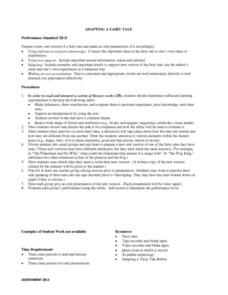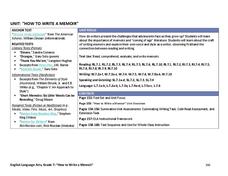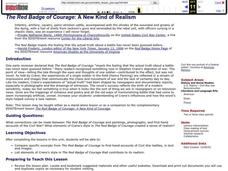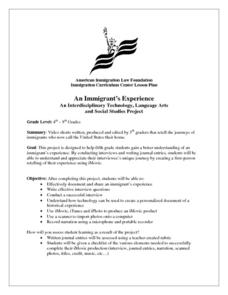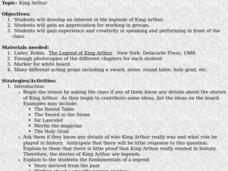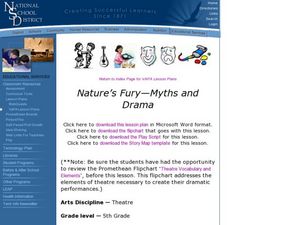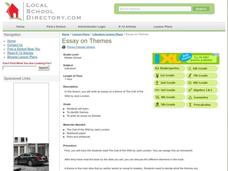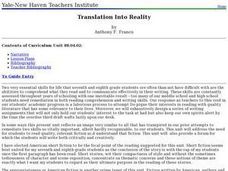Curated OER
Cause and Effect with "Cloudy With a Chance of Meatballs"
Fourth graders explore reasoning by reading a book with their classmates. In this cause and effect lesson, 4th graders read the children's story Cloudy with a Chance of Meatballs and discuss the story elements, characters and plot....
Curated OER
Robin Hood: England's Man of Mystery
Students study the tale of Robin Hood to further their knowledge of character traits, improve their vocabularies, and increase their knowledge of the Medieval Ages. In this Robin Hood lesson, students complete 14 lessons that help them...
Curated OER
Adapting a Fairy Tale
Students read and prepare a new oral version of a selected fairy tale. They read and compare/contrast two fairy tales and identify the main story elements. In small groups they create a new oral version of one they fairy tales and...
Curated OER
Lesson Plan 1: Introducing NaNo and Novels
Did you know that November is Novel Writing Month? In the first of a series of lessons, class members are introduced to the NaNoWriMo (National Novel Writing Month) project.
Louisiana Department of Education
How to Write a Memoir
Who are we and what shapes our identities? Seventh graders work to answer this question as they learn how to write a memoir. Full of non-print resources and supplemental texts that range from fiction to non-fiction, scholars write their...
Curated OER
Who Invented English Anyway?
In these English lesson plans, students use video, the Internet and non-fiction essays to research the history of the English language. They write a short research paper and design a PowerPoint presentation showcasing their findings.
Curated OER
Memoir
After reading and analyzing two narrative memoirs, middle schoolers engage in a variety of activities, including writing an essay, developing a story map, and creating character charts. They then compare and contrast story maps, and...
Curated OER
The Red Badge of Courage: A New Kind of Realism
Is it possible to tell a true war story? Tim O’Brien says that fiction is for “getting at the truth when the truth isn’t sufficient for the truth.” To get at the truth about war, class members examine primary source materials from the...
DeKalb County Schools
Compare/Contrast
A series of reading activities is sure to engage your young readers! Based on comparing and contrasting ideas, the packet provides opportunities to compare characters, themes, texts, and other elements of fiction.
American Immigration Law Foundation
An Immigrant’s Experience
After interviewing an immigrant about their voyage to the United States and first impressions of the country, young learners create a fictional series of journal entries and design an iMovie depicting their interviewee's story.
Curated OER
Comprehension: Setting
Students discuss what setting represents. In this language arts lesson, students review the three elements of setting: where the story takes place, when does the story take place, and is it past, present, or future? Students create a...
Curated OER
English
Students view examples of movies and create a movie trailer for an original thematic movie. In this fiction elements lesson, students complete creative event entries and view an abbreviated movie trailer from Alice. Students watch The...
Curated OER
Journey to the Center of the Earth I
Students identify the elements of science fiction and write their own example. For this Journey to the Center of the Earth lesson students complete several activities about science fiction, authors and novels.
Curated OER
The Time I Got Lost
Third graders go through the writing process but substitute paper and pencil with the computer to create a story about "The Time I Got Lost".
Curated OER
Web Quest on "How to Write a Mystery."
Students complete a Web Quest on How to Write a Mystery. They listen to or read a short mystery story and discuss its elements. They write an outline of a mystery story using all of the elements.
Curated OER
King Arthur
Students explore literary classics by reading The Legend of King Arthur. In this legendary story instructional activity, students read the story The Legend of King Arthur and identify the main characters and how they will reenact the...
Curated OER
Nature’s Fury—Myths and Drama
Fifth graders explore the elements of theatre. In this dramatic performances lesson, 5th graders discuss the structural elements of theatre and dramatize "The Origins of the Season," an explanation myth.
Curated OER
Reader's Theater with a Twist
Second graders create a Reader's Theater script. In this reader's theater lesson plan, 2nd graders create their own script of a story in groups. They make props and act them out on FlipVideo and voice thread.
Curated OER
And Tomorrow's Forecast Is...
Pupils create original short stories that feature distinctive weather phenomena, such as rainbows, snowstorms, tornadoes, thunder and/or lightning. They use a story map, imbedded in this plane, to help them organize their story.
Curated OER
Essay on Themes
Young scholars read the book THE CALL OF THE WILD by Jack London and discuss the different elements in the book. They then write an essay on a theme providing examples backing up their main point of their essay.
Curated OER
Translation Into Reality
Learners read a variety of short stories that focus on teenage protagonists. In groups, they answer comprehension questions and discuss the characters and setting for each story. Individually, they choose one writing assignment to...
Curated OER
Writing the Mystery with a Purpose
Students present the outline of the mystery story they are writing while working in reciprocal teaching groups. They respond to group members writing before they continue to finish revisions.
Curated OER
Things Aren't Always What They Seem
Students use video and the Internet to make predictions, draw conclusions, determine conflict and point of view while reading a short story. In this short story analysis lesson, students watch a related video and complete a prediction...
Curated OER
Inferring Themes
Fifth graders practice making inferences on various types of reading material. As a class, they develop a definition of the word "theme" and discuss themes for some of their favorite stories. They use the context of the reading...




